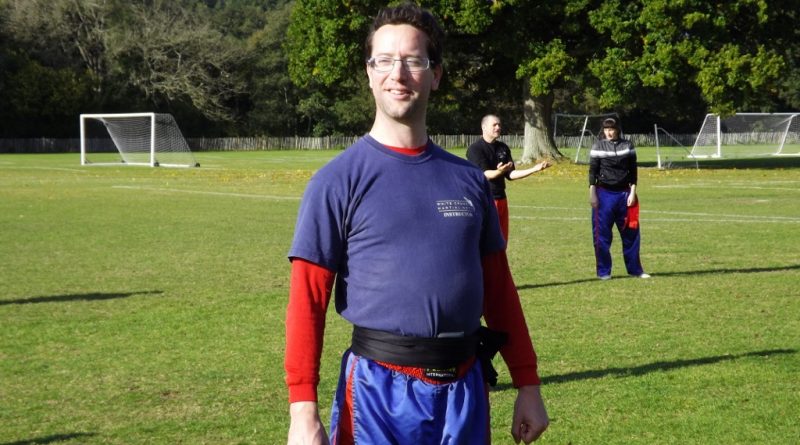Passing the Complete White Crane System; An Article by Joshua Haigh WCMA Instructor
Hi all!
I recently did something rather amazing! I have now learned, and graded on, all twenty syllabus patterns.
The actual grading took nearly one hour, and no mistakes are permitted! Some patterns leave you feeling drained, such as the Shaolin Lohan Staff, which involves using a solid steel bar as a staff. Some patterns have sections so similar to others you have to be careful not to start one pattern and finish with a different pattern, like the three San Zhan patterns. Some patterns are so familiar, you have to make a special effort to concentrate on them, like the first San Zhan pattern. I did do a previous grading where I reached San Zhan, relaxed, and promptly forgot what came next when my mind wandered! Being told I had passed by Mr Russell Suthern was both a pleasure and a relief!
This makes me an official white crane kung fu master. It’s rather a strange feeling, as I certainly don’t feel like I’ve mastered kung fu. There is plenty left to learn, and practice. In kung fu, as in nearly every other part of life, the more you learn, the more your realise there is that you don’t know. I like to call this the circle of ignorance! What’s inside the circle you know, and intially your circle of knowledge is small, so the boundary between what you know and what you know you don’t know is also small. It doesn’t look like there’s much to learn. As you learn more, your circle of knowledge increases in size, and so does the boundary. Suddenly, there is a lot more that you don’t know!
I feel that this is something wonderful. There is no limit on what you can learn, the only practical limitation is the number of hours you can devote to your chosen pursuit, in my case kung fu. Hopefully this is your chosen pursuit as well. And it means that I can continue to learn and improve, there will never be a point at which I can honestly say “Well, that’s it then. Kung fu mastered. What do I do next?”
Another rather nice analogy I like is that of climbing a mountain. I’ve been focused for so long on learning and passing the syllabus patterns, this has been the highest point of the mountain. Now that I have got to the top, had a look round, enjoyed the view, and suddenly the clouds have parted, and I can see that the peak I have reached is not the top of the mountain at all! There is more yet to come, and higher heights to achieve.
But what does this mean for you? Well, now that I have achieved ‘mastery’, this demonstrates that it is possible for anyone to achieve. I certainly didn’t leap forth from my mothers womb doing a flying side kick with a black belt already around my waist! Poor mother! I’ve had to struggle with the ‘impossible’, which somehow magically became possible after training that move for a very long time. I’ve had to have faith in my instructors that this ridiculous sticking hands exercise is actually very important and trains a crucial skill! (Spoiler alert: It does!) If you want to achieve what I have achieved, and more, you can do so. It may take longer, you may reach the same level quicker. It really doesn’t matter, once you have reached the skill level you are aiming for, you’ve got there!
Advice and shortcuts on how to achieve your goals? I can do that! First, there are no real shortcuts, so don’t look for them, but there are things you can do to speed up your learning process. Get mentors, who have achieved what you want to, in this case instructors. Actually listen to what they tell you, and don’t pick and choose by only listening to what you want to hear. Ask questions about everything you don’t fully understand, which is everything. Even if you think you know the answer, ask. Your instructor may give a variation on what you know, giving you a different angle to think about it.
However, understanding intellectually is subordinate to understanding physically, so if your instructor asks for volunteers to demonstrate on, volunteer. Every time. You will understand far more by being on the receiving end than by listening to words. And of course, practice. Practice, practise, pracise. Then practice some more! Only when you can’t practice should you think, talk, ask and write about your practice. Keep notes on everything you learn in class. When there’s a new bit of information you learn in class, write it down. I mean write it down after class, I don’t mean break off in the middle of class and start scribbling! Keep these notes safe, and review them regularly. Every year maybe.
Do not be disheartened if life gets in the way of your training. Family and jobs have to come first. If a change in your circumstances means you have to train less, then train less. There will come along another change in circumstances that means you will be able to train more later on.
Do all these things, and never quit training entirely, and you will be amazed at what you can achieve.
See you in the training hall.
Joshua Haigh
Instructor WCMA

